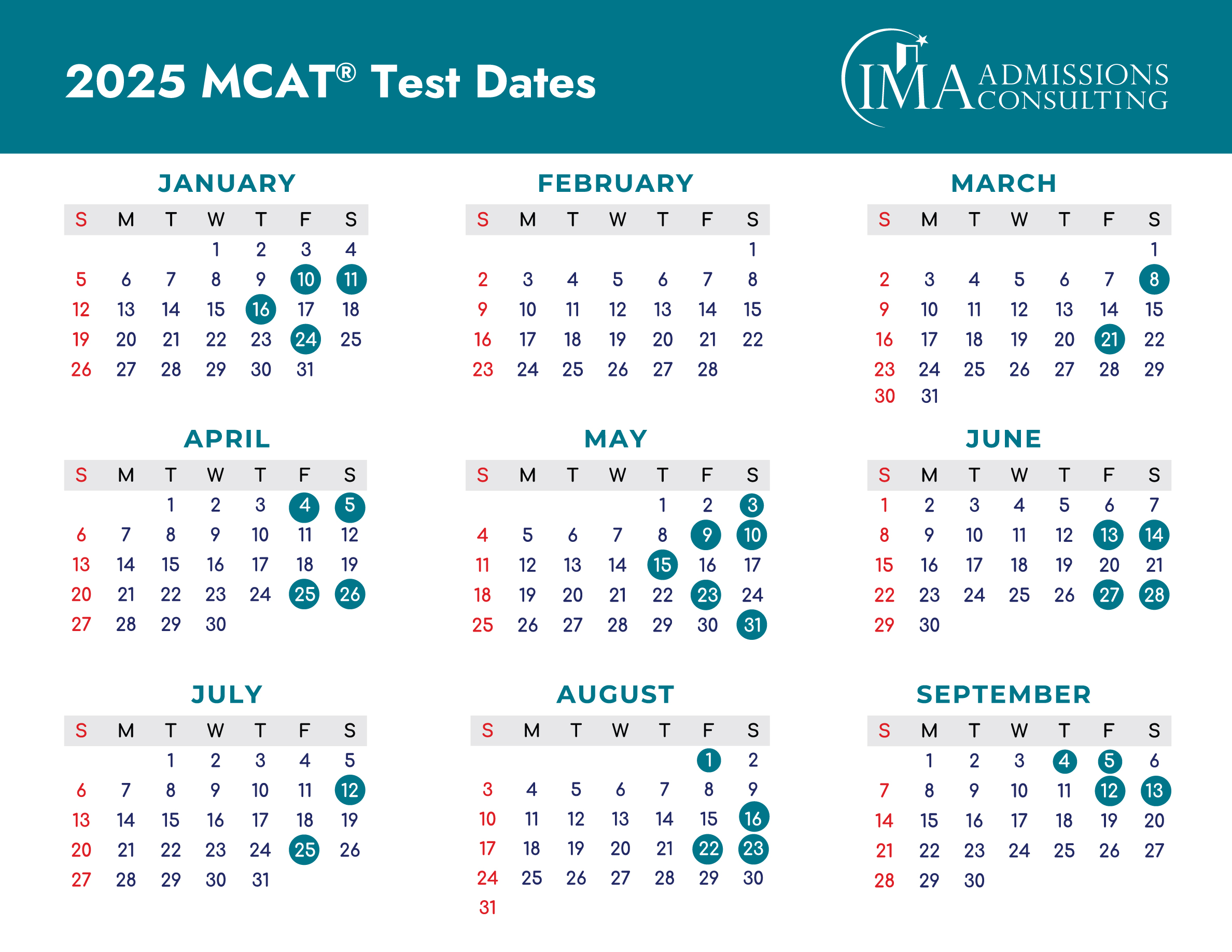Your roadmap for test dates, registration deadlines, score release schedules, and essential MCAT preparation tips.
For prospective medical students in the United States, Canada, and various parts of the world, the Medical College Admission Test (MCAT) is one of the most important hurdles to earning an M.D. or D.O. degree. This standardized exam, administered by the Association of American Medical Colleges (AAMC), serves as a crucial metric by which medical school admissions committees assess applicants’ foundational knowledge in science, critical thinking, and problem-solving skills.
Beyond mere numbers on a score report, the MCAT is designed to gauge whether you have the academic and reasoning abilities to excel in a medical curriculum and, eventually, in clinical practice.
Although the MCAT is known to be challenging, the good news is that its difficulty is purposeful: medical schools want to ensure their incoming students have the scientific knowledge, research acumen, and verbal reasoning skills necessary for success in both classroom and clinical settings. As you plan your path toward medical school, understanding the MCAT’s structure, the timing of test dates, and the score release schedule can help you optimize your application timeline.
In this comprehensive guide, we’ll walk you through the full 2025 MCAT testing calendar, including all 2025 MCAT Dates, deadlines for registration, rescheduling, and score releases. We’ll also explore key topics such as eligibility, the frequency of taking the MCAT, and essential test-day policies. Whether you’re a first-time test taker or planning a retake, you’ll find tips on mapping out your study schedule, deciding when to take the exam, and getting ready for every aspect of MCAT test day. Planning effectively and familiarizing yourself with the exam’s requirements can reduce stress, maximize your preparedness, and boost your chances of a strong MCAT performance.
What Is In This Guide
- Overview of the MCAT: Format, Sections, and Scoring
- 2025 MCAT Testing Dates Calendar at a Glance
- Understanding MCAT Registration and Deadlines
- Score Release Timeline Explained
- Fees, Rescheduling, and Cancellations
- Who is Eligible to Take the MCAT?
- When Should You Take the MCAT?
- Preparing for the MCAT: Study Strategies and Resources
- International Students and Special Permissions
- Retaking the MCAT: How Often Can You Test?
- Navigating Test Day: What to Expect
- Frequently Asked Questions (FAQ)
- Conclusion and Final Tips
Overview of the MCAT: Format, Sections, and Scoring
Before diving into the 2025 test dates, it’s important to understand the MCAT’s overall format and scoring system. This foundational knowledge helps you appreciate why certain deadlines and timelines exist (e.g., for score releases) and how best to align your preparation with your scheduled test date.
MCAT Format
The MCAT tests the skills and knowledge that medical educators and practicing doctors deem essential for success in medical school. Currently, the MCAT comprises four sections:
- Chemical and Physical Foundations of Biological Systems (Chem/Phys)
- Covers general chemistry, organic chemistry, introductory physics, basic biochemistry, and biology.
- Emphasizes how physical and chemical principles underlie human body functions and the biochemical interactions that enable life.
- Critical Analysis and Reasoning Skills (CARS)
- Tests reading comprehension and analytical thinking skills using humanities and social sciences passages.
- You must draw inferences, assess arguments, and evaluate information under timed conditions.
- Biological and Biochemical Foundations of Living Systems (Bio/Biochem)
- Focuses on biology and biochemistry concepts, including the function of biomolecules, cellular processes, and organismal biology.
- Integrates key principles learned in undergraduate biology and biochemistry courses.
- Psychological, Social, and Biological Foundations of Behavior (Psych/Soc)
- Assesses knowledge of psychology, sociology, and related research methods.
- Explores how behavioral and sociocultural factors influence health, illness, and medical care.
Each section is allotted a set amount of time, usually between 90 to 95 minutes per section, and you’ll receive optional breaks in between. The total seated time for the MCAT is around 7.5 hours (including optional breaks).
Scoring System
Each of the four MCAT sections is scored on a scale of 118 to 132, for a possible total score range of 472 to 528. The scale’s midpoint for each section is 125 (total midpoint of 500). This scoring system, implemented since the 2015 MCAT revision, helps differentiate between small performance differences among test-takers.
Timing and Breaks
You can move on to the next section as soon as you finish the current section, or you can take the full optional break time (10 minutes between two of the sections and one 30-minute mid-exam break). Remember that unused time from a section or a break does not roll over to the next exam portion. It’s crucial to pace yourself during the test and know that you can’t go back to previous questions once you move forward.
With the format and timing in mind, let’s move on to the 2025 MCAT testing calendar. Knowing what days the exam is offered and the corresponding registration deadlines will help you determine the best date to sit for the MCAT based on your med school application cycle and personal preparation timeline.
2025 MCAT Testing Calendar at a Glance
Below is the official 2025 MCAT testing calendar for U.S. test centers, the 60-day, 30-day, and 10-day scheduling deadlines, and the corresponding score release dates. Remember that all scheduling deadlines fall at 11:59 p.m. local test center time on the deadline day. Score release times are typically by 5:00 p.m. ET on the indicated day.
Important Note:
- The 10-day Deadline is the final day to schedule, reschedule, or cancel a reservation. It is also the last day to edit personal information such as your name, address, and consents.
- Refer to the MCAT Essentials for detailed policies and the Scheduling Fees for cost information.

Key Takeaways
- The 60-day and 30-day deadlines come into play if you want to avoid higher registration fees as you schedule or adjust your exam date.
- The 10-day deadline is crucial: after this point, no rescheduling or cancellation is possible, and you cannot change personal information in your registration.
- Score releases generally happen 30-35 days after each exam date. Knowing your score release date is essential if you aim to meet medical school application timelines.
The testing dates and deadlines for Canadian and international test centers often mirror the U.S. schedule, but slight variations may exist. If you plan to test outside the United States, always check the AAMC website for the most accurate and up-to-date international calendar.
MCAT Registration and Deadlines
Registration Windows
MCAT registration typically opens in two major waves:
- Late fall of the previous year (around October-November) for the January through June test dates.
- Early spring of the testing year (around February) for July through September test dates.
For the 2025 testing year, registration for exams from January and March through June is already open (as of publication). If you plan to take the exam in July, August, or September 2025, you’ll want to keep an eye on official announcements from the AAMC so you can register as soon as slots open.
The 10-Day Deadline
Remembering the 10-day cutoff before your chosen test date is the most critical deadline. By this point, you must finalize any scheduling changes, cancellations, or modifications to your personal information. While you can make changes right up to this deadline, settling your test plans earlier is often advisable to avoid last-minute stress or complications if your preferred seat is no longer available.
Last-Minute Scheduling and Availability
Since many MCAT test dates fill up months in advance, you should register as early as possible to secure your preferred date and location. Some examinees, especially those applying in the same cycle, prefer the earliest dates in the year (January through April) to ensure their MCAT scores are ready for primary medical school applications (which typically open in late May or early June). If these seats fill quickly, consider later dates or travel to a test center that is not your top choice.
Advance Scheduling for Special Cases
Certain groups, such as examinees with approved testing accommodations, may receive advance scheduling options for July through September exam dates. If you’re eligible for such a benefit, you will typically be notified directly by Pearson VUE or AAMC. Be sure to monitor your email for instructions and deadline reminders.
Score Release Timeline Explained
Most 2025 MCAT score release dates fall roughly one month after each test date. The AAMC ensures that this timeframe remains consistent so applicants can plan their application timeline accordingly. Scores are generally posted by 5:00 p.m. ET on the official release date.
Here’s why the timing matters:
- Medical School Applications: Many applicants wish to have their scores in hand before submitting their primary application. This allows them to make informed decisions about target schools based on their MCAT performance.
- Retake Considerations: If you’re contemplating a retake, you must receive your score before deciding. Waiting until late in the cycle might reduce your flexibility with test dates.
- Rolling Admissions: Most U.S. medical schools have rolling admissions policies, meaning submitting your application as early as possible can be advantageous.
If you sit for a January or early spring MCAT, you’ll have your scores in time for the primary application window (beginning late May/early June), allowing you to apply very early. If you take the exam in the late summer or early fall, your scores will arrive much later in the cycle, which may or may not affect your competitiveness, depending on each medical school’s rolling policies.
Fees, Rescheduling, and Cancellations
Basic Registration Fees
The AAMC has a tiered fee structure based on how far in advance you schedule your MCAT exam. The closer you register to the test date, the higher the registration fee will be. While the exact fees can vary from year to year, you can expect to pay more if you wait until after the 60-day or 30-day deadlines. Always consult the latest official MCAT fee schedule on the AAMC website for updated amounts.
Rescheduling and Cancellation Fees
- Rescheduling: Changing your test date or test center location generally incurs a fee, which can escalate the closer you are to your test date.
- Cancellation: You may receive a partial refund if you cancel by the appropriate deadline. Canceling late typically means forfeiting more of the fee—or all of it if it’s past the 10-day deadline.
- Emergency Refund Requests: In certain extenuating circumstances (e.g., severe illness, natural disasters), the AAMC may offer an emergency refund option. Proof is required, and requests are not guaranteed to be approved.
The “10-Day” Constraint
After the 10-day cutoff, there is no option to reschedule. You also lose the ability to edit your registration details. You can explore an Emergency Refund Request if an emergency arises within that 10-day window. However, such approval is not automatic, and you should not rely on it as a guarantee if you change your mind or face a non-critical situation.
Who is Eligible to Take the MCAT?
General Eligibility
You can take the MCAT if you plan to apply to any health professions school that accepts MCAT scores to satisfy their admissions requirements. This includes but is not limited to:
- M.D.-granting programs (allopathic)
- D.O.-granting programs (osteopathic)
- Podiatric (D.P.M) programs
- Veterinary (D.V.M) programs
When registering, you must agree to a statement confirming your intention to apply to a health professions program that accepts MCAT scores.
International Students
There are no additional eligibility hoops for international students. If you hold (or are currently pursuing) an MBBS or equivalent degree from outside the U.S. or Canada, you can register for the MCAT without seeking special permission. You should, however, check the AAMC’s guidelines and your prospective programs to ensure they accept MCAT scores from international applicants.
Special Permission
If you’re not planning to apply to a health professions program or enrolled in a medical school (other than an MBBS program), you must request “special permission” to take the MCAT. Email the MCAT program office (mcat@aamc.org) with your reasoning for taking the exam. Processing these requests can take up to five business days or more during peak times, so be mindful of registration deadlines.
When Should You Take the MCAT?
Determining the best time to take the MCAT is a strategic decision that can impact your entire medical school application cycle. Below are some key considerations to help you choose the right test date:
Timing Relative to the Application Cycle
Most medical students take the MCAT the same year they apply. For instance, if you plan to start medical school in Fall 2026, you typically apply in the 2025 cycle (with applications opening in June 2025). In that case, you’d want to have your MCAT scores ready by early summer 2025, allowing you to submit your primary applications as soon as they open.
Allowing Time for Retakes
If you believe you may retake the MCAT, scheduling your first exam earlier in the year (such as January through May) leaves you wiggle room to retest in the summer or early fall if needed. This is especially valuable because MCAT test dates from June onward can fill quickly, and you might not secure your ideal date if you wait until the last minute.
Mastery of Content
The MCAT covers a broad range of undergraduate-level science topics in biology, chemistry, physics, biochemistry, psychology, and sociology. Ensure you’ve completed the relevant coursework or self-study before booking your test date. Many students need at least three to four months of dedicated study time to be fully prepared, though this can vary significantly depending on individual study habits and academic background.
Advisor Consultation
If you can access a pre-health or academic advisor, consult them when planning your MCAT timeline. Advisors can help you determine whether your current coursework, extracurricular commitments, and personal responsibilities allow for adequate MCAT preparation. If you do not have a pre-health advisor, you can use the National Association of Advisors for the Health Professions (NAAHP) as a resource to connect with someone who can guide you.
Personal Readiness
The MCAT is not just another exam; it’s a significant milestone on your journey to medical school. If you rush into the exam without being prepared, you risk underperforming, which could lead to a retake (and additional fees, stress, and time). While earlier is typically better, do not take the exam before you’re ready.
MCAT Prep Study Strategies and Resources
Foundational Courses
Because the MCAT’s science sections draw on content from prerequisite courses like general chemistry, organic chemistry, physics, biology, and biochemistry, it’s critical to have a strong foundation in these areas. Ensure you’ve taken (or are concurrently taking) these courses well before your test date. Introductory psychology and sociology are also important for the Psychological, Social, and Biological Foundations of Behavior section.
Study Materials and Practice Exams
- AAMC Official Guides and Question Packs: The AAMC offers official practice exams that closely mimic the real MCAT’s format and difficulty. These are invaluable for gauging your readiness.
- Commercial Prep Courses: Companies like Kaplan, Princeton Review, and Blueprint MCAT offer structured prep courses, which can be classroom-based or online.
- Self-Study: Many students use books, flashcards, online videos, and free question banks.
- Study Groups: Collaborating with peers can help you stay motivated and clarify difficult concepts.
Create a Study Schedule
Designing a study plan is one of the most critical aspects of MCAT success. Factors to consider:
- Total Study Time: Typically, 300-500 hours of study is a common benchmark. Spread this across 12-16 weeks for a more balanced approach.
- Daily and Weekly Goals: Break down your content review, practice questions, and full-length exams into manageable milestones.
- Full-Length Simulations: Aim to take 4-6 full-length MCAT practice exams under timed conditions to build endurance and familiarity.
- Review: Dedicate ample time to thoroughly analyze your incorrect answers and revisit weak areas.
Balancing Commitments
If you’re juggling academic coursework, a job, or extracurricular activities, be realistic about how much daily or weekly time you can devote to MCAT study. It’s often better to postpone the exam rather than attempt to prepare amid an overwhelming schedule.
International Students and Special Permissions
International Test Centers
The AAMC offers MCAT testing in various countries worldwide, although seat availability can be limited. Register early to secure a convenient location if you’re outside North America. Also, pay attention to any additional registration fees or regional policies.
Visa and Travel Considerations
Some international students prefer traveling to the United States or Canada to take the MCAT. In that case, consider travel, accommodation, and potential visa requirements. Plan these logistics well in advance—preferably at least 2-3 months before your test date.
MBBS and Equivalent Degrees
Students in (or graduates of) MBBS programs can register for the MCAT without additional permission. All other international students or medical graduates should check the AAMC guidelines to confirm their eligibility.
Special Permission Requests
As stated earlier, if you do not plan on applying to a health professions program or you’re enrolled in a medical program other than MBBS, you must request special permission by emailing the MCAT program office. Be mindful of the time it might take for the AAMC to respond.
Retaking the MCAT: How Often Can You Test?
Although the MCAT can be taken multiple times, specific limits prevent excessive retesting and encourage students to be intentional about each attempt.
- Single Testing Year: Up to 3 attempts.
- Two Consecutive Years: Up to 4 attempts total.
- Lifetime Limit: 7 attempts in your entire lifetime.
Both voided exams (where you choose to void your score at the end of the test) and no-shows (failure to appear on test day) count toward these limits. You can only hold one seat registration at a time; after your exam date passes (or you cancel), you can schedule another. It typically takes about 24 hours after your test date for the system to update your eligibility to register again.
Should You Retake the MCAT?
Retaking the MCAT should be a carefully considered decision. While medical schools can see all your MCAT attempts, many admissions committees focus primarily on your highest or most recent score. However, multiple attempts may raise questions about your consistency and preparation strategy.
Consider retaking the exam if:
- You had significant personal or technical issues on test day.
- You scored well below your target range.
- You identified clear, fixable weaknesses in content or test-taking strategy.
If your final score is near the median of accepted students at your target schools, you should consult with an advisor to determine whether a retake would genuinely benefit your application or pose unnecessary risk.
Test Day and What to Expect
Arrival and Check-In
Plan to arrive at the test center at least 30 minutes before your scheduled start time. You must present a valid, unexpired government-issued photo ID (e.g., passport, driver’s license). The name on your ID must match exactly the name you used to register.
What to Bring
- Required: A valid ID.
- Recommended: Light sweater or jacket since test center temperatures can vary.
- Food/Drink: You can store snacks and drinks in a locker, which you can only access during breaks.
- Medication: If you need medication during the test, plan to keep it in your locker and take it during breaks.
Check-In and Security
Test-day security is strict. You’ll likely have your palms scanned or photographed, and you’ll need to store personal items (bags, phones, etc.) in a locker. Unauthorized items are not allowed in the testing room. Taking breaks outside the designated times or leaving the testing facility can jeopardize your test.
During the Exam
You’ll have access to an on-screen timer, which counts down your remaining time for each section. You can also flag questions within the section to review them if time allows. The test center provides noteboards (or laminated sheets) and markers for scratch work; be sure to follow instructions on how to use them properly.
Optional Breaks
You get short breaks between sections (typically 10 minutes each) and one longer, 30-minute break about halfway through the exam. Breaks are your opportunity to use the restroom, eat a snack, or take medication. However, if you finish a section early, the remaining time does not carry over to your break—nor can you “bank” break time to add to another section.
Voiding Scores
After the final section, you have the option to void your score. Once you void, there is no way to retrieve that score. A voided exam still counts toward your lifetime MCAT attempt limits, so consider this carefully.
How International Medical Aid Can Help You Plan for the MCAT and Medical School Admissions
The MCAT and the medical school admissions process can feel overwhelming, especially with many critical decisions—when to test, how to study, where to apply, and more. This is where International Medical Aid comes in. As a comprehensive resource for pre-med students, we offer personalized guidance and evidence-based strategies to simplify your journey and help you stand out in a competitive applicant pool.
Personalized MCAT Preparation
MedicalAid.org understands that a “one-size-fits-all” approach rarely works for MCAT prep. Every student comes with unique academic backgrounds, learning styles, and scheduling constraints. Their resources and mentorship programs are designed to:
- Diagnose Strengths and Weaknesses: Through personalized assessments and one-on-one advising, you can identify subject areas where you need extra practice—whether it’s chemistry, biology, psychology, or critical reading.
- Build Efficient Study Plans: Expert medical school application advisors can help you create a strategic study schedule that accommodates your work, classes, or other responsibilities, ensuring you spend time where it truly counts.
- Recommend High-Yield Materials: Rather than juggling countless books and online tools, you’ll get clear recommendations on vetted study resources, practice exams, and review techniques that align with your budget and timeline.
Application and Admissions Support
Achieving a great MCAT score is only half the battle. MedicalAid.org provides holistic admissions guidance to help you craft a compelling application:
- Personal Statement Review: Receive detailed feedback on your essay to ensure it reflects your experiences, motivations, and readiness for medical school.
- Extracurricular and Clinical Advising: How many shadowing hours do you need, or which volunteering opportunities will resonate most with admissions committees? Our advisors can point you to the right activities that strengthen your profile.
- School Selection Strategy: With thousands of applicants competing for limited spots, targeting the right mix of programs is essential. IMA helps you balance “reach,” “target,” and “safety” schools based on your stats, experiences, and career goals.
Ongoing Mentorship and Community
IMA goes beyond quick fixes by fostering a supportive environment where students can continually learn and adapt:
- Useful Content: Stay updated on the latest trends in MCAT prep, interview strategies, and medical school requirements through regular online events.
- Peer Networking: Connect with fellow pre-med students, share tips, and find accountability partners who understand the demands of the MCAT and the admissions process.
- Expert Insights: From admissions officers to current medical students, you’ll have access to professionals who’ve navigated the journey successfully and can offer insider perspectives.
Whether you’re mapping out your initial MCAT study plan or refining your entire application for medical school, MedicalAid.org is a powerful ally. With personalized advising, robust resources, and a supportive community, you’ll be better equipped to meet every milestone—getting a competitive MCAT score, crafting an outstanding application, and ultimately securing your acceptance to the medical program of your dreams.
Frequently Asked Questions (FAQ)
Below are common questions examinees ask about the MCAT, registration, and test-day logistics.
Can I View Other Available Test Dates Without Losing My Current Reservation?
Yes. You can log back into the MCAT Registration System and browse available seats. Your reservation is only lost if you reschedule and pay for a new seat.
When is the Last Day I Can Reschedule or Cancel?
You can reschedule or cancel your MCAT exam until the 10-day deadline before your test date. After that, no rescheduling is permitted, and cancellations may only qualify for an Emergency Refund Request under special circumstances.
How Long Do I Have to Wait to Retake the Exam?
The MCAT Registration System usually updates within 24 hours after your test date. Once it’s updated, you can register for a new exam. Remember the test attempt limits and scheduling deadlines for future test dates.
How Do I Get Notified If a Seat Opens on a Full Test Date?
AAMC provides the MCAT® Appointment Notification Request tool. You can sign up for an email alert if your preferred test date and location are available. Act fast when you receive a notification; seats can fill up again quickly.
Does My Preparation Differ for M.D. vs. D.O. Programs?
Not really. The MCAT is structured to evaluate foundational knowledge and problem-solving skills needed for both allopathic (M.D.) and osteopathic (D.O.) medical schools. Both paths share highly similar curricula, especially through the pre-clerkship and clerkship years.
What if I’m Taking the MCAT for a Non-Medical Health Program?
If your health profession (e.g., veterinary or podiatric) program accepts MCAT scores instead of other standardized tests, you should prepare similarly to pre-med students. The exam content is the same for all test-takers.
Can I Skip the Breaks?
Yes. Breaks are optional. You can proceed to the next section immediately, but the unused break time is not added to your next section’s timer.
Conclusion and Final Tips
With 2025 MCAT test dates laid out, it’s vital to plan your registration and study schedules in harmony with these deadlines. By understanding the 60-day, 30-day, and 10-day cutoff dates, you can avoid paying extra fees and ensure you lock in a test date and location that aligns with your medical school application timeline.
Here are our final recommendations for MCAT success:
- Register Early
MCAT seats can disappear quickly—especially in densely populated areas and for popular test months (April, May, June). Register as soon as possible to avoid traveling far for your exam if you have a specific date. - Study with Intention
The MCAT is exhaustive, covering a wide range of topics. Use official AAMC materials and high-quality practice exams to gauge your progress. Identify weak areas and bolster them through targeted study rather than random review. - Take Practice Exams Under Realistic Conditions
Simulate real test-day conditions, including timing yourself and limiting breaks to the official durations. This helps you build stamina for the 7.5-hour exam. - Seek Guidance
If you feel stuck, consult academic advisors, student forums, or tutoring services. An outside perspective can help you refine your approach and boost your confidence. - Be Strategic About Timing
If you’re applying to medical school in the upcoming cycle, aim for a test date that provides ample preparation time while aligning with your application deadlines. If you anticipate a retake, choose an earlier exam date in the year. - Manage Stress and Mental Health
Adequate rest, healthy eating, and stress-management techniques (e.g., meditation, exercise, or hobbies) can significantly improve your focus and mental endurance. - Keep an Eye on Score Release Dates
Plan your secondary application submissions and interview prep around when you expect to receive your MCAT results. Having your score in hand can guide your school selection strategy.
By following these guidelines and thoroughly reviewing all essential details about MCAT registration, eligibility, and exam-day logistics, you can create a structured plan that leads to success. Whether you are an aspiring physician (M.D. or D.O.), a future podiatrist, a veterinarian, or a healthcare professional, the MCAT is a pivotal step in your educational journey. Your greatest allies are preparation, timing, and a clear understanding of the process.
Additional Resources
- MCAT Score Calculator: Predict and Convert Your Scores (2025)
- Best Classes to Take Before the MCAT
- Retaking the MCAT: Everything You Need to Know
- MCAT Sections Guide: Experts Explain the MCAT
The MCAT is a challenging but rewarding test that serves as a gateway to a fulfilling career in healthcare. With the proper timeline, robust preparation, and an organized approach, you can confidently navigate the 2025 MCAT Testing cycle and position yourself as a competitive candidate for medical or other health-related professional schools. Good luck on your MCAT journey and your future in the medical field!




